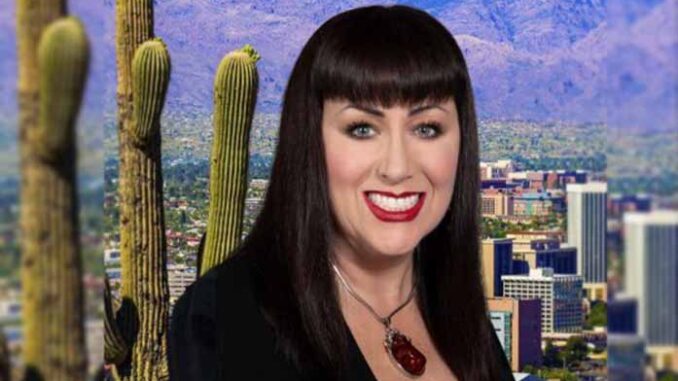
A Pima County judge will hear testimony and arguments next Monday about whether Justine Wadsack was legally qualified this year to run for state senator of Legislative District 17. But one person the judge will not be hearing from is the candidate’s husband.
Justine Wadsack ousted incumbent Sen. Vince Leach by nearly 2,000 votes during the recent Republican primary although Leach has not conceded. Now Wadsack’s place on the 2022 General Election ballot is under legal review of whether she actually resides in LD17, which covers parts of Pima and Pinal counties in and near Tucson.
Court records show Wadsack was previously registered to vote with an address on East 6th Street in Tucson where she lived for several years with her husband Garret and her two children. She changed her voter registration on Feb. 18 to an address on Oakbrook Street in Tucson, although her family appears to still reside at the 6th Street home located within the heavily Democratic LD20.
Wadsack’s attorney, Michael Kielsky, told Judge Richard E. Gordon earlier this week his client “has not spent a night” at the 6th Street address since February. That is believed to be what Wadsack will testify to under oath at an Aug. 29 evidentiary hearing set by Gordon.
But the judge will not be presented any testimony from Garret Wadsack because Justine Wadsack has invoked her right of spousal privilege, Kielsky told Gordon.
In most situations the statutes prevents a spouse from being questioned or called to testify about the other spouse without first obtaining the other spouse’s consent. Therefore, the only person who can give Garret Wadsack the green light to discuss his knowledge of Justine Wadsack’s residency is Justine Wadsack.
The plaintiffs in the case, all three of whom are residents of LD17, believe they have sufficient evidence disproving Wadsack’s residency claim even if the candidate refuses to allow her husband to testify.
Tim La Sota, the plaintiffs’ attorney, points to Pima County’s elections department which lists Wadsack (as of Aug. 24) as an elected Republican precinct committeeman of LD20 and she is an elected state committeeman for the Republican Party of Arizona for LD20. There is also the fact Wadsack’s senate campaign’s mailing address is a private mailbox service one mile from the 6th Street home and nearly 18 miles from the Oakbrook address, La Sota notes.
Wadsack even signed several of her owns nomination petitions for the state senate using the 6th Street address before crossing it out and writing in the Oakbrook address. Further, La Sota points out a candidate financial disclosure form Wadsack filed March 6 is marked “yes” to the question of whether she resides with her spouse.
La Sota also provided the judge an extensive report prepared in July by a private investigator who turned up no reference to Wadsack residing on Oakbrook.
The investigator reviewed various databases, as well as Wadsack’s real estate license and her vehicle registration records. He also obtained information about another woman who “clearly resides” at the Oakbrook home, La Sota wrote in one of his court filings.
“After all the evidence and testimony is presented, the conclusion will be inescapable that Wadsack is not a resident of legislative district 17,” La Sota argues, adding that “candidates must do more than just register to vote in the district or take cursory actions to establish residency” if they want to run for state office in a new district.
But Wadsack’s attorney is hoping Gordon will deny the election challenge without taking testimony.
Kielsky has filed a motion to dismiss the case based on various arguments, including the fact that state law allowed the plaintiffs to file a challenge as early as March 7 or sometime shortly thereafter when other LD17 residents -including Sen. Leach- started questioning Wadsack’s claim of residency.
“It could have been brought at the outset of the primary, before the candidates had spent months and tens of thousands of dollars campaigning and, more importantly, before voters had made their choice,” Kielsky argues in the motion.
In response, La Sota agrees that LD17 voters could have challenged Wadsack’s residency prior to the Aug. 2 primary election. But he points the judge to ARS 16-372(A) which allows a challenge to be made once someone is “declared nominated
to a state office at a primary election,” including a challenge that the person elected “was not at the time of the election eligible to the office.”
La Sota has also submitted information in advance of the Aug. 29 evidentiary hearing of a radio interview Wadsack gave in November 2021 during which she discussed the qualifications to represent LD17 given that redistricting was moving her 6th Street home into a heavily Democratic district.
In the interview, Wadsack overlooks or does not know that state law requires a candidate for Arizona Senate or the House of Representatives to be a resident of the legislative district they wish to represent. Instead, Wadsack references the requirement of age, being an Arizona resident for three years, and being “from the County” the legislative district covers for at least one year before the election.
An immediate appeal to the Arizona Supreme Court is expected regardless of which side wins with Gordon. If Wadsack is ultimately disqualified from the Republican primary then Leach would be reported to the Secretary of State’s Office as the winner to take on Democrat Mike Nickerson in the upcoming 2022 General Election.
Meanwhile, the judge gave permission to Arizona Secretary of State Katie Hobbs to skip all future proceedings in the Wadsack case upon learning Hobbs “does not intend to take a position on the substantive issues before the Court, and will comply with this Court’s final judgment,” according to her attorney.
